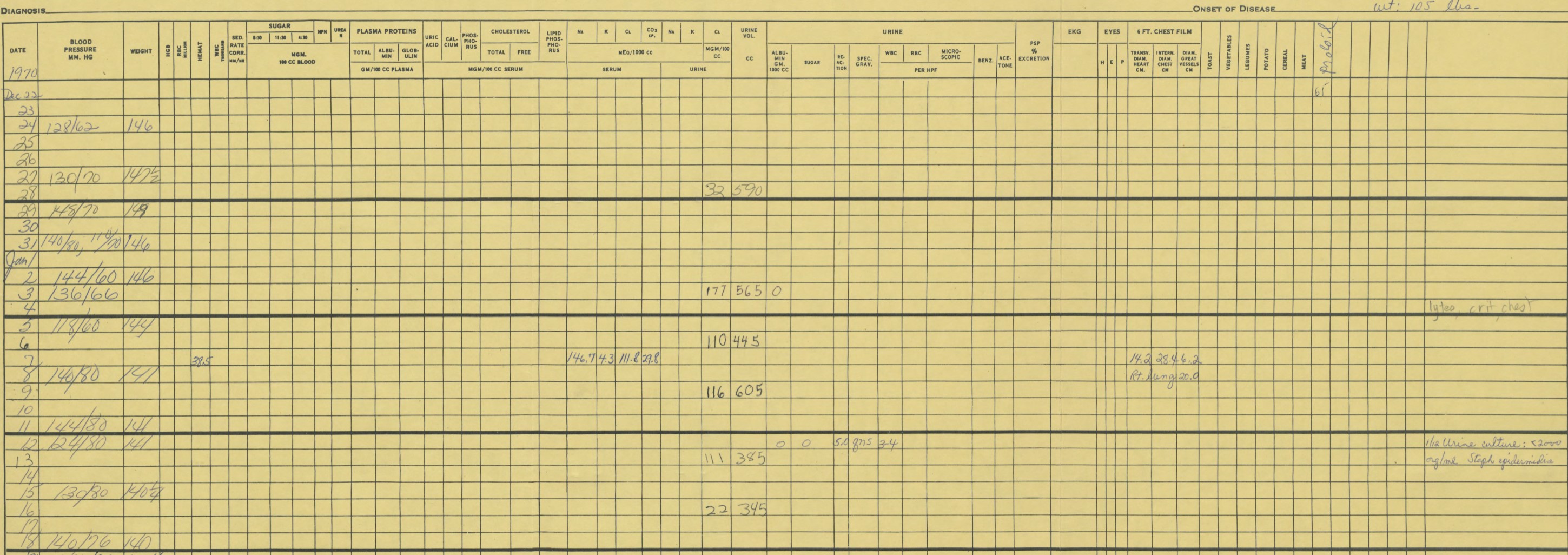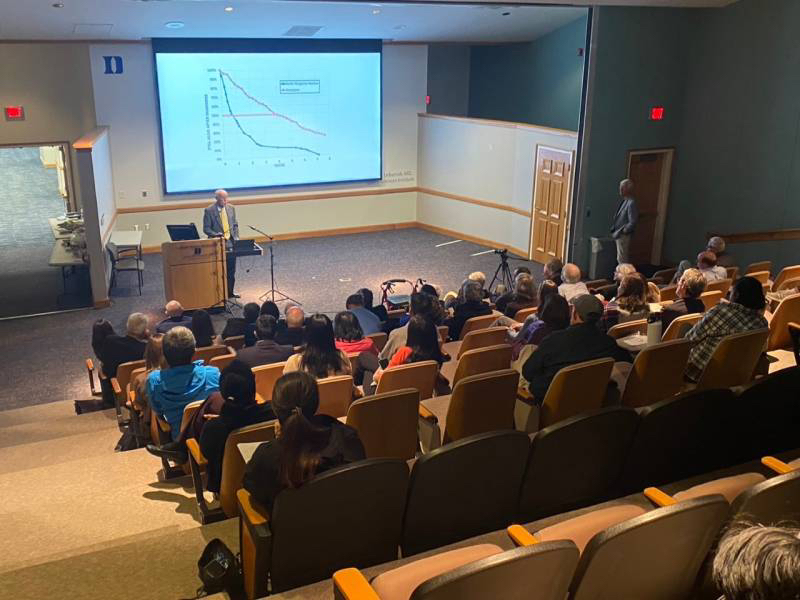RDD Project
Rice Diet Database Project

Background
The Duke University Rice Diet Program (RDP), 1940-2002, traces its origins to studies of cell respiration done by the Nobel Laureate Otto Warburg and a young researcher in his lab, Walter Kempner who came to Duke in 1934 from Germany. The first chairman of Duke Department of Medicine, Fredrick Hanes, and his successor, Eugene Stead, supported Kempner and the RDP because it proved highly successful in treating severe hypertension before the advent of antihypertensive drugs. For example, between 1940 and 1955, more than 300 patients with malignant hypertension enrolled in the RDP. Untreated, patients with this disease lived an average of eight months. After enrollment in the RDP, many patients survived for years. This program also benefitted patients with less severe hypertension, diabetic complications, kidney disease, congestive heart failure and obesity, all without use of medications.
The success of the program was attributed by Kempner to the diet’s extremely low sodium (<5 mmol/day), protein (~5% kcal) and fat content (~5% kcal). Compliance with this dietary intervention was monitored by regular measurements of 24-hour urine chloride/sodium excretion. Results of in vitro cell respiration studies using the Warburg apparatus suggested suboptimal amino acid deamination by hypoxic kidneys in patients with hypertension and cardiovascular/metabolic diseases. By lowering dietary intake of protein, and its accompanying sulfur and phosphorus, Kempner reduced the “stress” to the kidneys of RDP patients.
The detailed records of 16,155 adult RDP patients have recently been converted into a dataset held by the Duke Nephrology division under the Duke IRB-approved protocol “Impact of the Rice Diet on Hypertension and Metabolic Diseases” (Pro00105257). This trove of data includes weight and blood pressure measurements, serum and urine biochemistries, cardiac size measurements, and basal metabolic rates (BMR). Retinal images taken by Kempner during treatment of patients with hypertension or diabetes have been digitalized and are being analyzed by machine learning.
The intention of the present IRB-approved research effort is to make this unique and irreplaceable dataset available to all qualified researchers. Kempner’s RDP, and its measured compliance data, represent the largest diet intervention study ever undertaken. It offers quantitative evidence that “food is medicine”. The results of this program promise to offer proof of concept that dietary intervention leads to improved health and as well as longer lifespans.
Objectives
Objectives of the Rice Diet Database Project:
-
- Objective 1: Digitally preserve the yellow charts of eye grounds of the Rice Diet Program
- 114 boxes (52,082 sheets) of charts
- 33 boxes (59,628 prints, slides, negatives, notes) of eye ground photos
- All yellow charts and retinal photos are digitally stored in the medical archive
- Additional data preservation: 39 boxes of medical notes and lab reports
- Objective 2: Establish a database and make the database available to other investigators
- Database with raw data is established in REDCap
- Ongoing data cleaning:
- Check for errors from initial data entry or iMerit entry
- Identify physiologically impossible values
- Establish a management system to maintain the database and allow for others to access the database
- Objective 3: Conduct data analyses to answer research questions including diet and kidney health
- OCR subproject: [description]
- AI eye subproject: [description]
- EKG subproject: [description]
- Timeline
- 2019: pilot digitalization (4% of charts)
- 2020-2021: full phase digitalization (charts and eyegrounds)
- 2020-present: OCR project, Eyeground AI project, other analyses
- Objective 1: Digitally preserve the yellow charts of eye grounds of the Rice Diet Program
Publications
Abstracts:
(Presented) AHA-malignant hypertension 2023: AHA poster 2023
(Presented) AHA-retina 2022: AHA Retina Abstract 6 2022
(Presented) AHA-malignant hypertension 2022: AHA poster 2022
Manuscripts:
(In process) Malignant hypertension
(In process) Hypertension
Database Access
If you are looking for access to the database, please contact Pao-Hwa Lin, Ph.D. at pao.hwa.lin@duke.edu
Team
- Investigators:
- Pao-Hwa Lin (Duke Nephrology, PI)
- Scott Sanoff (Duke Nephrology, co-PI)
- Frank Neelon (Duke Endocrinology, emeritus, co-I)
- Phil Klemmer (UNC Nephrology, emeritus, co-I)
- David Clemmons (UNC Endocrinology, emeritus, co-I)
- Ingrid Daubechies (Duke Mathematics, co-I)
- Harvey Estes (Duke Cardiology, emeritus, co-I)
- Anthony Kuo (Duke Ophthalmology, co-I)
- Yi-Ju Li (Duke Bioinformatics and Statistics, co-I)
- Christoph Lippert (Plattner Institute Germany, co-I)
- Fred Luft (Charite Institute, Nephrology, co-I)
- Other Duke team members:
- Anastacia Bohannon (Duke Nephrology, study coordinator)
- William McDowell (Data tech)
- David Lopez (Data tech)
- Jane Ok La (Data analyst)
- Helen Xu (part time QC, work study student)
Educational Resources
Contemporary Analysis of the Duke Rice Diet Data: Merging Traditional and AI Approaches Symposium (November 13, 2023)
Event recording: link

